Steps the government should take for Eid travellers

The upcoming national election means that the travelling woes for homeward bound people this Eid-ul-Azha will be tied to the government's image issue. Therefore, the government is expected to take the necessary steps to reduce the passengers' sufferings and the fare-related anarchy that is usually rampant in our transport sector during Eid rush.
According to a survey by the Bangladesh Jatri Kalyan Samity (BJKS), more than 11 million people from Dhaka, Narayanganj, Munshiganj, Gazipur and the nearby districts will travel to different parts of the country this Eid. In addition, almost four million people are expected to travel between different districts. Even though Eid travels started from June 22, the main travelling flow is expected to begin on June 26, after salaries and bonuses are disbursed to jobholders. On June 26-27, it's expected that 3-3.5 million people on average will leave the capital every day. The government's decision of close garments and other factories for the holidays in stages was easier to implement during Eid-ul-Fitr than it will be for Eid-ul-Azha.
Our public transportation system has the capacity to carry 800,000 to a million passengers by road and waterways, and another 120,000 via railway. However, if more passengers are loaded than the available capacity, it results in terrible suffering for the general public. In certain routes, there are 8-10 times more passengers than the capacity for public transportation that is available. These routes are mired by traffic and human congestion.
The major challenges in this year's Eid travels are going to be traffic jams, road accidents, slow pace of toll collection, low velocity of cattle-carrying vehicles, and cattle markets and pop-up markets on the roadside. Hence, if the smooth flow of public transportation is hindered, then we might see hellish conditions on the roads this Eid.
Our public transportation sector has been going through a terrible crisis for many years. Like Eid-ul-Fitr, 800,000 to a million bikers may carry almost 1.6 million passengers by motorcycle to their destinations this Eid. While this may alleviate some pressure from public transport, it will increase the risk of road accidents and loss of lives.
Our public transportation system has the capacity to carry 800,000 to a million passengers by road and waterways, and another 120,000 via railway. However, if more passengers are loaded than the available capacity, it results in terrible suffering for the general public. In certain routes, there are 8-10 times more passengers than the capacity for public transportation that is available. These routes are mired by traffic and human congestion.
People in the northern regions of the country may suffer the most during Eid travels this year. People travelling along the road between Dhaka airport and Gazipur, up to the other side of the Bangabandhu Bridge, may have to suffer quite a lot due to cattle-carrying trucks and roadside cattle markets, which will lead to terrible traffic at various exit points and leave the travellers to wait hours on end trying to leave the capital. It is imperative that all the pavements and roads in the capital be cleared of hawkers, illegal parking and cattle markets. Smaller vehicles such as rickshaws, battery-run rickshaws, and easy bikes should be barred from highways.
Having observed the trends in Eid travelling over the last few years, we have seen different wings of the police work tirelessly to keep the roads and highways flowing smoothly. But some dishonest members of the law enforcement agencies and extortion by a few transport leaders often rub the sheen off the hard work of many. Besides, the practice of analogue toll collection in today's "Digital Bangladesh" creates choke points at toll collection booths, creating horrific tailbacks, which often get as long as 10-20 kilometres. These are easily fixable problems that merely require the relevant authorities to be willing to find solutions.
There are some dishonest transport owners and drivers who leverage the excessive pressure of passengers and transportation crisis to make extra profits. The weakness of government regulatory agencies, with the "endorsement" of some law enforcement members, allows for this to happen. Some symbolic measures are taken against them in the form of mobile courts, but that does not do much in preventing the collection of excessive fares. Thus, in many cases, there may be attempts to charge double of triple the amount of regular fare from passengers during Eid. To establish the rule of law and to help the general public, tough measures need to be taken to stop the collection of extra fares during Eid travels.
Every year during Eid, we see unfit vehicles being deployed with a fresh coat of paint to make them look new. Unfit water vehicles are repaired in the dockyards. Some dishonest transport owners find a way to cheat the system and run these vehicles during Eid travels to carry both passengers and cargo. When these vehicles get into accidents, investigation shows that they do not have any fitness clearances, the drivers don't have licences, or there are no route permits.
Even on the waterways, it is a common sight that vehicles without enough buoys, lamps, and other life-saving equipment are handed over to unskilled boatmen with the responsibility of transporting thousands of passengers. There has been a lack of skilled drivers on the roads as well. As a result, during the Eid seasons, drivers are often required to undertake shifts of 10, 15 or even 20 hours non-stop. Unskilled drivers driving unfit vehicles results in the deaths of hundreds of passengers during Eid every year. According to observations made by the BJKS, during Eid-ul-Azha in 2022, 398 people died and 774 were injured in 319 road accidents.
Online train tickets have resulted in railway passengers being placed in a bit of a hassle this Eid. As in the past, initiatives to help people may be hindered by black marketers and syndicates of dishonest railway employees. Due to 100 percent of the tickets being available online, a large section of marginalised people will remain deprived of railway services. Taking this matter into consideration, it is important that necessary measures are eventually taken to include marginalised people into the public transport services provided by the state.
Every year during Eid, we see travel agencies hoard tickets for internal flight routes and sell them to passengers at hiked prices. The same has been happening this year. During Eid, between 100,000 and 200,000 passengers travel by air. For the benefit of these passengers, the director of the national consumer rights protection and district administrations should be conducting mobile court drives.
With the rising prices of commodities and an unemployment crisis, Eid travellers this year will be massively affected by hijackers and conmen. These incidents are enough to ruin Eid celebrations for anyone. Thus, it is important for law enforcement members to be on alert at bus and train stations and river ports. Steps should be taken to stop robberies and theft on the highways as well.
Translated from Bangla by Azmin Azran.
Mozammel Hoque Chowdhury is secretary general at Bangladesh Jatri Kalyan Samity.

 For all latest news, follow The Daily Star's Google News channel.
For all latest news, follow The Daily Star's Google News channel. 
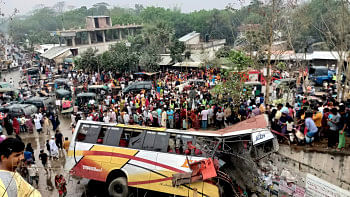



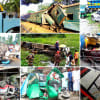
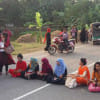
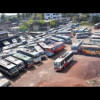
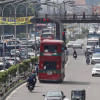
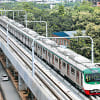


Comments